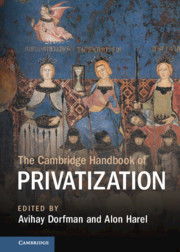Book contents
- The Cambridge Handbook of Privatization
- The Cambridge Handbook of Privatization
- Copyright page
- Contents
- Figures
- Tables
- Contributors
- Acknowledgments
- Introduction
- Part I On the Virtues of Public Provision (Agency-Based Approaches)
- 1 The Wrong of Privatization: A Kantian Account
- 2 Privatization, Efficiency, and the Distribution of Economic Power
- 3 Public and Private Ownership in Plato and Aristotle
- 4 Privatizing Criminal Punishment: What Is at Stake?
- 5 Justice and the Market
- 6 Outsourcing Border Control: Public Agency and Action in Migration
- 7 The Moral Neutrality of Privatization as Such
- Part II On the Virtues of Publicness as a Means to the Realization of Procedural Values (Process-Based Theories)
- Part III Outcome-Based Theories: On the Virtues and Vices of Public Provision as a Means to Promote Efficiency and Justice
- Index
4 - Privatizing Criminal Punishment: What Is at Stake?
from Part I - On the Virtues of Public Provision (Agency-Based Approaches)
Published online by Cambridge University Press: 27 August 2021
- The Cambridge Handbook of Privatization
- The Cambridge Handbook of Privatization
- Copyright page
- Contents
- Figures
- Tables
- Contributors
- Acknowledgments
- Introduction
- Part I On the Virtues of Public Provision (Agency-Based Approaches)
- 1 The Wrong of Privatization: A Kantian Account
- 2 Privatization, Efficiency, and the Distribution of Economic Power
- 3 Public and Private Ownership in Plato and Aristotle
- 4 Privatizing Criminal Punishment: What Is at Stake?
- 5 Justice and the Market
- 6 Outsourcing Border Control: Public Agency and Action in Migration
- 7 The Moral Neutrality of Privatization as Such
- Part II On the Virtues of Publicness as a Means to the Realization of Procedural Values (Process-Based Theories)
- Part III Outcome-Based Theories: On the Virtues and Vices of Public Provision as a Means to Promote Efficiency and Justice
- Index
Summary
What, if anything, is lost when we privatize criminal punishment? The literature responding to this question is already vast and growing. But it would be a mistake to understand it as forming a single, coherent line of inquiry. Writers on this topic have raised concerns of at least three different sorts. Concerns of the first sort are specific to a particular legal order, suggesting that some legal doctrine in that jurisdiction prohibits the privatization of one sort of criminal punishment or another. In the United States, for instance, much of the literature in this vein has focused on specific constitutional and administrative law doctrines, as well as specific legislative obstacles to the privatization of criminal punishment. There have been similar scholarly movements in many other countries, as well.
There is a second literature on privatization that has more universal ambitions. These writings argue that if we privatize criminal punishment, we will necessarily run afoul of many of our broader normative commitments.
- Type
- Chapter
- Information
- The Cambridge Handbook of Privatization , pp. 69 - 84Publisher: Cambridge University PressPrint publication year: 2021
- 3
- Cited by

